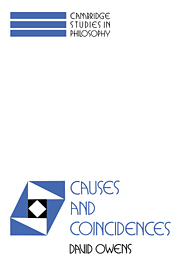
-
Select format
-
- Publisher:
- Cambridge University Press
- Publication date:
- October 2009
- August 1992
- ISBN:
- 9780511520068
- 9780521416504
- 9780521044486
- Dimensions:
- (216 x 138 mm)
- Weight & Pages:
- 0.371kg, 204 Pages
- Dimensions:
- (216 x 138 mm)
- Weight & Pages:
- 0.279kg, 204 Pages
- Subjects:
- Philosophy: General Interest, Philosophy
- Series:
- Cambridge Studies in Philosophy
You may already have access via personal or institutional login- Subjects:
- Philosophy: General Interest, Philosophy
- Series:
- Cambridge Studies in Philosophy
Book description
In an important departure from theories of causation, David Owens proposes that coincidences have no causes, and that a cause is something which ensures that its effects are no coincidence. In Causes and Coincidences, he elucidates the idea of a coincidence as an event which can be analysed into constituent events, the nomological antecedents of which are independent of each other. He also suggests that causal facts can be analysed in terms of non-causal facts, including relations of necessity. Thus, causation is defined in terms of coincidence, and coincidence without reference to causation. David Owens challenges the ideas associated with Hume, Davidson and Lewis, constructing a theory which distinguishes nomological necessity and sufficiency from their logical counterparts. He is able to offer novel solutions to the major problems of causation, including the direction of causation, the logical form of causal statements, the distinction betwen causal connections and logical connections, and the relationship between psychological and physical causation.
Reviews
"...Owens' candor, his willingness to express philosophical puzzlement where puzzles exist for him, is especially refreshing. His book is a lively contribution to the growing literature on causation." Philosophy and Phenomenological Research
Contents
Metrics
Altmetric attention score
Full text views
Full text views help Loading metrics...
Loading metrics...
* Views captured on Cambridge Core between #date#. This data will be updated every 24 hours.
Usage data cannot currently be displayed.
Accessibility standard: Unknown
Why this information is here
This section outlines the accessibility features of this content - including support for screen readers, full keyboard navigation and high-contrast display options. This may not be relevant for you.
Accessibility Information
Accessibility compliance for the PDF of this book is currently unknown and may be updated in the future.


